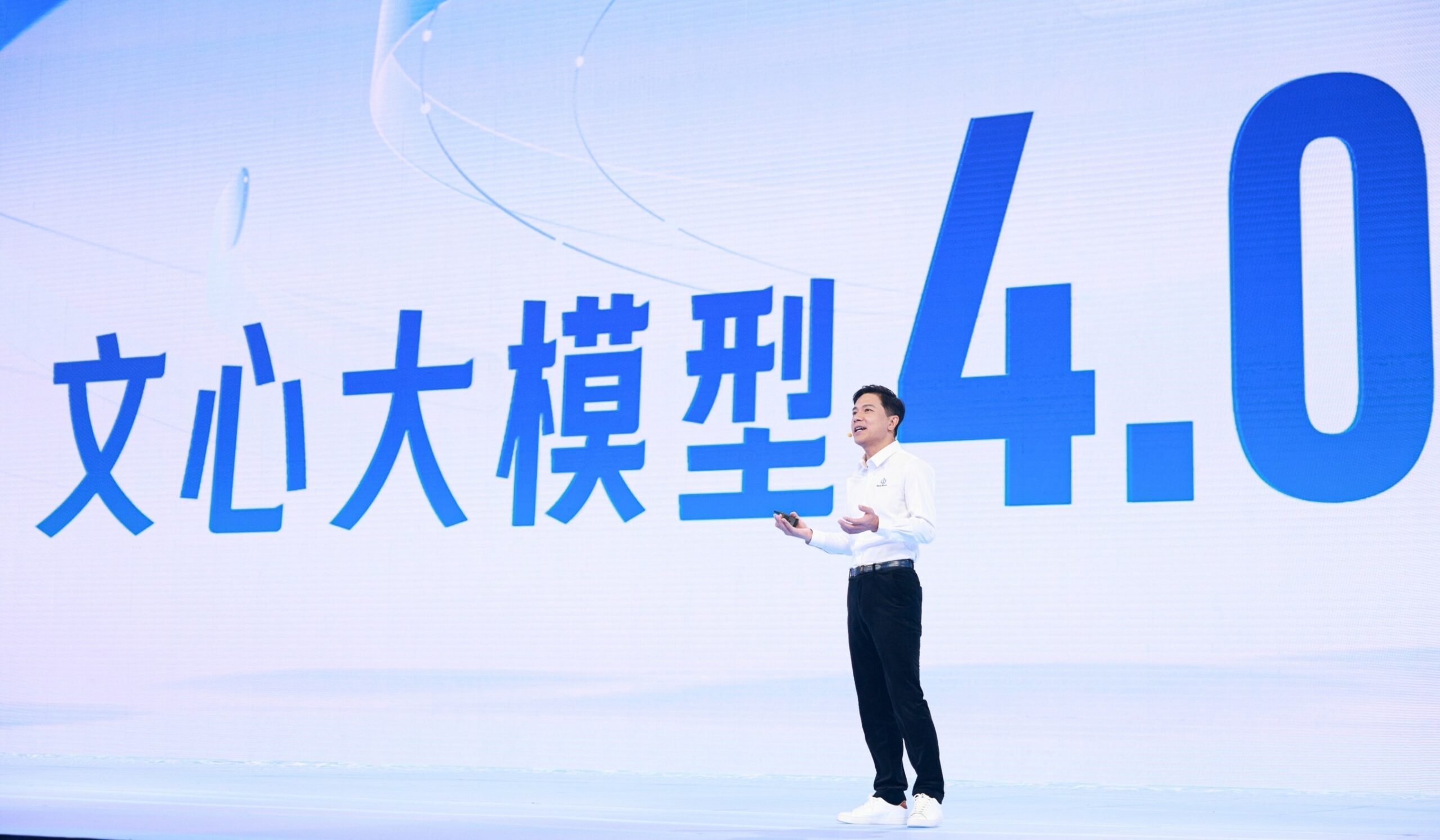Chinese firms are racing in a competitive frenzy to harness the potential of generative artificial intelligence (AI), a realm thrust into the limelight by models like ChatGPT. With a projected market size of RMB 38.8 billion in 2023 and an anticipated annual growth rate of 27.32% between 2023 and 2030, generative AI in China is reshaping various sectors. Chinese tech companies, both large and start-up, are crafting large language models (LLM) to challenge Western tech giants. Moreover, generative AI is making its way into the healthcare sector and on e-commerce platforms. As generative AI integration gains momentum, it emerges as a disruptive force, promising cost-cutting and efficiency benefits. However, businesses must navigate the evolving regulatory landscape.
Download our report on the she economy in China

Tech giants and startups are challenging Microsoft, Amazon, and OpenAI
Alibaba’s upgraded AI model and new platform for businesses
In October 2023, Alibaba introduced an upgraded version of its AI model, Tongyi Qianwen 2.0. Compared to its previous model released earlier in April, this model is proficient in understanding complex instructions, copywriting, reasoning, memorization, and preventing hallucinations.
Moreover, Alibaba launched the GenAI Service Platform, which allows companies to develop their own generative AI applications using their own data. This addresses concerns among businesses about potential third-party access to private company data when using public generative AI products. These advancements underscore Alibaba’s commitment to competing with the rival services Microsoft’s Azure OpenAI Studio and Amazon Web Service’s Bedrock.
Although Alibaba holds the dominant market share in China’s cloud industry, Microsoft and Amazon are still leading overseas. By releasing the GenAI Service Platform, Alibaba indicates its determination to enhance its global cloud services portfolio and solidify its position as a strong player in the broader cloud computing market, aiming to bridge the gap with industry leaders beyond China’s borders.
Can Baidu’s ERNIE 4.0 rival GPT-4?
In the same month as Alibaba, Baidu unveiled ERNIE 4.0, its most recent AI model, during the Baidu World 2023 conference. The CEO emphasized that this new version represents a comprehensive upgrade from its predecessor. Notably, he confidently asserted that ERNIE 4.0 does not lag behind GPT-4 in any aspect.
Despite these ambitious claims, Baidu experienced a setback in the stock market as its Hong Kong-listed shares declined by 1.65%, and Nasdaq-listed shares dropped by 4.12%. Investor concerns lingered over long-term issues, particularly how Baidu would navigate chip sanctions. Large language models like Ernie require high-performance memory chips, but with the US banning the export of more AI chips to China in October 2023, Baidu faces a challenging landscape.

A new domestic large language model for China
In March 2023, renowned computer scientist Kai-Fu Lee introduced 01.AI, a company dedicated to creating a domestic large language model tailored for the Chinese market. Merely seven months after its inception, 01.AI unveiled its first model, the open-source Yi-34B. Although specific fundraising figures were not disclosed, the start-up has achieved a valuation of RMB 7.1 billion. This valuation was attained through financial backing from prominent investors, including Sinovation Ventures and Alibaba Cloud.
Chinese companies race to integrate generative AI into smartphones
Apple has announced plans to incorporate generative AI into their iPhones by late 2024, while Samsung is considering doing the same by early 2024. In contrast, Chinese smartphone manufacturers are eager to expedite the integration of generative AI into their products. Xiaomi has taken a proactive step by initiating the integration process, as the CEO confirmed in August 2023 that their smart home device digital assistant, Xiao Ai, is undergoing upgrades to include generative AI capabilities. This enhancement will enable Xiao Ai to provide more informative responses, facilitate real-time language translation, and even engage in creative tasks such as composing poems, musical pieces, and emails.
Similarly, competitors such as Huawei, Oppo, and Vivo have outlined plans to integrate generative AI into their phones, laptops, and smart cars as soon as possible. This collective push among Chinese phone brands reflects the intense competition within the market.
Generative AI performs almost as well as real doctors
China’s AI-related healthcare industry surpassed RMB 10 billion in market scale in 2022, and it is projected to grow at an annual rate of 40% over the next three to five years. In particular, generative AI is making strides in the Chinese healthcare sector, with the potential to enhance efficiency and reduce costs.
Medlinker, a Chinese online healthcare provider, introduced China’s first medical large language model, MedGPT, in 2023. Claiming to emulate a human doctor, MedGPT demonstrated impressive diagnostic capabilities, scoring 7.2 out of 10 in a performance evaluation, where human doctors averaged 7.5.
Despite the promising results, the commercialization of this tool is currently on hold. The Beijing Municipal Health Commission has recently imposed restrictions on the use of generative AI in online healthcare activities. The regulations state that individuals operating AI medical devices will need to possess professional qualifications. To enhance accountability, all physicians are mandated to undergo real-name authentication to ensure that medical services are directly administered by the identified individuals. Moreover, the regulations explicitly prohibit AI medical software from substituting doctors in the provision of medical diagnosis.
Generative AI redefines content creations for influencers and streaming platforms
Alibaba’s Animate Anyone AI model sparks interest on GitHub
Alibaba’s innovative AI model, Animate Anyone, has introduced a transformative tool capable of turning static images into videos. The technology holds promise for influencers, enabling the creation of AI-generated personalized content with lower efforts. Animate Anyone distinguishes itself from other animation tools by producing refined outputs with consistent frames, making animations nearly indistinguishable from reality. The platform has sparked significant interest, with requests flooding its GitHub page for access to the source code.

Generative AI cuts animation production time by nearly two-thirds
Animation studios like Base Media are also delving into generative AI experiments. iQiyi, the Chinese streaming giant, commissioned Base Media to use AI for animation, reducing production time by nearly two-thirds. It is particularly useful to create locations, which usually takes 30% of the production time. However, while Chinese clients embrace AI-generated animations eagerly, US clients are wary of copyright concerns and often require agreements ensuring no AI involvement in the creative process.

AI-generated live streaming hosts: between efficiency and authenticity
In China’s online shopping, the use of virtual hosts is booming, especially in live streaming. E-commerce giants, like JD.com, have embraced this trend, introducing AI-generated hosts like Xiaomei in 2022. This approach not only caters to the popularity of live streaming but also offers significant advantages as AI avatars can promote products 24/7, resulting in increased sales for businesses.
Since 2022, a wave of Chinese start-ups and major tech firms have flooded the market with services that create avatars for e-commerce live streaming. This allows brands to replicate a human streamer with just a few minutes of sample video and a price of RMB 8,000. After inputting the product information, the digital influencer can start live streaming. The virtual host can even analyze live comments and retrieve responses from its database, enabling real-time interactions with the audience.

With the rise of AI-generated hosts, brands have the unique opportunity to craft their own influencers, providing an unprecedented level of control over the narrative surrounding their products. Yet, the genuine interaction brought by human influencers remains difficult to replicate. As brands navigate this shift, they must carefully weigh the advantages of narrative control against the value of authentic, human connections in the live streaming realm.
Generative AI in video games: opportunities for foreign game companies
While generative AI is currently in its early stages of influencing video games, industry leaders anticipate that within the next five to ten years, it will play a pivotal role in over 50% of the video game development process, compared to less than 5% today.
Western game developers could benefit significantly from using generative AI to craft more immersive experiences, with a particular focus on role-playing games (RPGs), a genre that enjoys immense popularity in China. The adoption of text-generating AI tools empowers writers to generate a diverse array of original dialogues for non-playable characters (NPCs), adding depth and richness to in-game narratives.
Moreover, the application of generative AI extends to the creation of non-linear storylines, promising to deliver uniquely tailored experiences for each player. Lastly, akin to its impact on animation, the use of generative AI has the potential to speed up the production process. This could involve tasks such as creating in-game locations more efficiently and cost-effectively.
New regulations for generative AI in China
In October 2023, China took a significant step in regulating generative AI services by unveiling draft security regulations. These regulations introduce specific restrictions on the data sources used for training AI models. The move reflects China’s commitment to ensuring responsible and secure development of generative AI, where the potential impact on data privacy and security is substantial. By addressing data-related concerns through these regulations, China seeks to strike a balance between fostering innovation and safeguarding the ethical and security considerations associated with the burgeoning field of generative AI.
Key insights from the rise of generative AI in China:
- Alibaba and Baidu have showcased significant strides in generative AI, with Alibaba introducing Tongyi Qianwen 2.0 and Baidu launching ERNIE 4.0.
- Companies like Xiaomi, Huawei, Oppo, and Vivo are racing to integrate generative AI into their devices.
- The introduction of MedGPT by Medlinker marks a significant advancement in AI’s role in healthcare. Despite regulatory challenges, the potential for AI to enhance medical diagnostics is evident.
- Alibaba’s Animate Anyone AI and Base Media’s experiments underscore the transformative impact of generative AI in content creation and animation, reducing production time significantly.
- The surge in AI-generated virtual hosts in online shopping, particularly live streaming, is reshaping how products are promoted.
- In the video game industry, generative AI has the potential to enhance immersive experiences and storytelling while reducing production time.
- New regulations concerning generative AI in China demonstrate the government’s commitment to ensuring responsible AI development. Balancing innovation with ethical considerations is at the forefront of these efforts.





